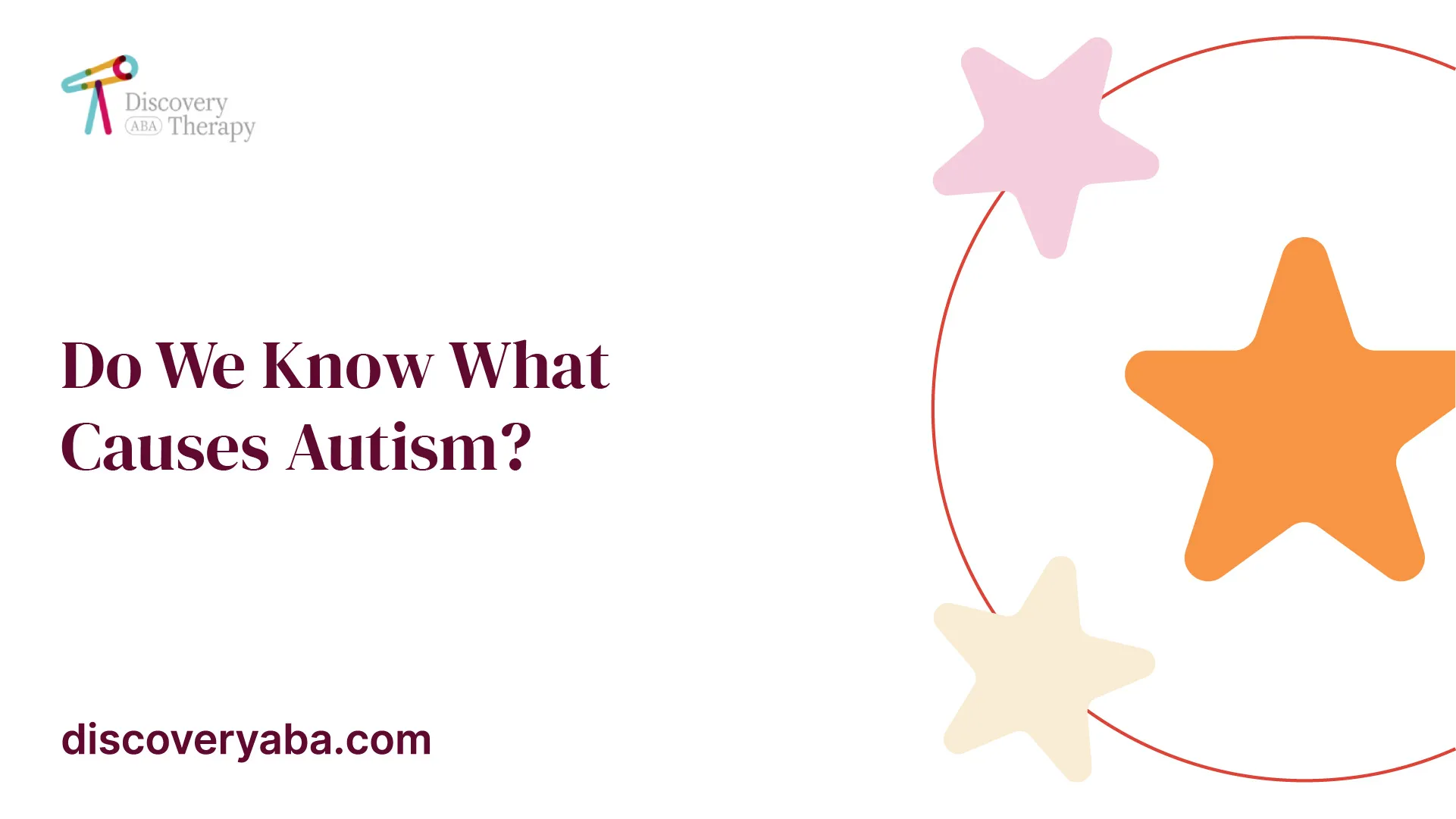Do We Know What Causes Autism?
Autism is a neurodevelopmental disorder that affects communication and behavior. It is a complex condition, and scientists are still trying to understand its causes. While there is no definitive answer, researchers have identified several potential factors that may contribute to autism.

Genetic Factors
Studies have shown that genetics play a significant role in the development of autism. According to the National Institute of Mental Health (NIMH), if one identical twin has autism, there is a 60-90% chance the other twin will also have the disorder. This suggests that there is a strong genetic component to the disorder.
Furthermore, researchers have identified several genes that may be linked to the development of autism. While the exact cause of autism is still unknown, these studies suggest that there may be a complex interplay between genetic and environmental factors that contribute to the development of the disorder.
It's important to continue researching the genetic and environmental factors that contribute to autism in order to better understand the disorder and develop effective treatments for those with the condition.
Environmental Factors
Environmental factors may also contribute to the development of autism. While genetics play a significant role in the risk of developing autism, environmental factors can also have an impact. For example, studies have shown that children born to mothers who smoked during pregnancy are at an increased risk of developing autism. This is thought to be due to the toxic chemicals found in cigarette smoke, which can damage the developing brain.
Other possible environmental factors that have been linked to autism include exposure to certain chemicals, such as pesticides and air pollutants. Pollution from vehicles and factories has been shown to increase the risk of autism in children who are exposed to it during pregnancy or early childhood. Additionally, exposure to heavy metals such as lead and mercury has also been linked to an increased risk of autism.
It's important to note that while environmental factors can play a role in the development of autism, they are not the sole cause. Autism is a complex disorder with many contributing factors, and more research is needed to fully understand the role that environmental factors play in its development.

Brain Development
Autism is a complex neurodevelopmental disorder that is believed to be caused by differences in brain development. While the exact cause of autism is still being studied, researchers have identified several areas of the brain that may be affected by autism. These include the amygdala, which is responsible for processing emotions, and the prefrontal cortex, which is involved in decision-making and social behavior.
In addition, studies have shown that there may be differences in the way that the brains of individuals with autism process information. For example, some individuals with autism may have difficulty processing sensory information, such as sounds or lights. Others may have difficulty with language or social communication.
It's important to note that autism is a spectrum disorder, which means that the symptoms and severity can vary widely from person to person. While there is no known cure for autism, early intervention and therapy can help individuals with autism to develop important skills and improve their overall quality of life.
Types of Autism Spectrum Disorder
Autism is a spectrum disorder, which means that there are different types of autism spectrum disorder (ASD). The Diagnostic and Statistical Manual of Mental Disorders (DSM-5) defines three levels of ASD: Level 1 (requiring support), Level 2 (requiring substantial support), and Level 3 (requiring very substantial support).
In addition to the three levels, there are also different subtypes of ASD. These include:
- Autistic Disorder: This is the most severe form of ASD. Individuals with autistic disorder have significant language and communication difficulties, as well as repetitive behaviors.
- Asperger's Syndrome: Individuals with Asperger's syndrome have average or above-average intelligence but struggle with social interaction and communication.
- Pervasive Developmental Disorder - Not Otherwise Specified (PDD-NOS): This diagnosis is given to individuals who have some but not all of the symptoms of autism.
It's important to note that these subtypes are no longer used in the DSM-5 diagnosis criteria for ASD. Instead, clinicians use the three levels to determine the level of support an individual with ASD requires.
Understanding the different types and subtypes of ASD can help clinicians provide appropriate support and treatment for individuals with autism.
Early Signs of Autism in Children
Identifying early signs of autism can help parents and caregivers seek early intervention and support for their child. Here are some potential early signs of autism in children:
- Lack of eye contact
- Delayed speech or language skills
- Repetitive behaviors, such as rocking or hand-flapping
- Lack of interest in playing with other children
- Difficulty with social interaction and communication
- Fixation on certain objects or topics
It's important to note that not all children with autism will exhibit these early signs, and some may develop normally before showing symptoms later on. However, if you notice any of these potential early signs of autism in your child, it's important to speak with your pediatrician or a specialist who can provide an evaluation and diagnosis. Early intervention and therapy can make a significant difference in the development and quality of life for children with autism.
Epigenetics and Autism
Epigenetics refers to changes in gene expression that occur without any changes to the underlying DNA sequence. While genetic factors are known to play a significant role in the development of autism, recent research has also suggested that epigenetic changes may be involved.
Studies have found that certain environmental factors, such as exposure to toxins or stress during pregnancy, can cause epigenetic changes that affect the developing brain and increase the risk of autism. Additionally, researchers have identified specific genes associated with autism that undergo epigenetic modifications.
Understanding the role of epigenetics in the development of autism could lead to new treatments and interventions for individuals with the disorder. However, more research is needed to fully understand how these complex interactions between genetic and environmental factors contribute to the development of autism.
How Income and Education Affect the Diagnosis and Treatment of Autism?
Research has shown that socioeconomic status (SES) can have an impact on the diagnosis and treatment of autism. Children from lower SES backgrounds may be less likely to receive a timely diagnosis of autism, which can delay access to important interventions and therapies.
Furthermore, even after a diagnosis is made, children from lower SES backgrounds may have less access to quality healthcare and specialized services for autism. This can lead to disparities in treatment outcomes and long-term outcomes for individuals with autism.
It's important for healthcare providers and policymakers to address these disparities in order to ensure that all children with autism have access to timely diagnosis and effective treatments, regardless of their socioeconomic background. This may involve increasing access to healthcare services and interventions in underserved communities, as well as addressing systemic inequalities that contribute to these disparities.
Therapies for Autism
While there is no known cure for autism, early intervention and therapy can help individuals with autism to develop important skills and improve their overall quality of life. There are several types of therapies that may be beneficial for individuals with autism, including:
Applied Behavior Analysis (ABA)
Applied Behavior Analysis (ABA) is a type of therapy that focuses on teaching new skills and behaviors to individuals with autism through positive reinforcement. This therapy is based on the principles of behaviorism, which suggest that all behavior is learned and can be changed through conditioning.
ABA has been shown to be an effective therapy for improving communication, social skills, and adaptive behavior in children with autism. However, it's important to note that ABA is a time-intensive and costly therapy that requires significant commitment from both the child and their caregivers.
Occupational Therapy
Occupational therapy focuses on helping individuals with autism develop the skills they need to perform daily activities independently. This may include developing fine motor skills such as handwriting or using utensils, as well as improving sensory processing abilities.
Occupational therapy can also help individuals with autism learn coping strategies for dealing with sensory overload or other challenges associated with the disorder. This type of therapy can be particularly helpful for children with autism who struggle with routine tasks such as getting dressed or brushing their teeth.
Speech Therapy
Speech therapy focuses on improving communication skills in individuals with autism. This may include developing language skills such as vocabulary and grammar, as well as improving nonverbal communication such as body language and facial expressions.
Speech therapists may also work on pragmatic language skills, which involve understanding social cues and appropriate conversation topics. For some individuals with autism, speech therapy may also involve augmentative and alternative communication (AAC) devices such as picture boards or electronic devices that allow them to communicate more effectively.
Social Skills Training
Social skills training focuses on helping individuals with autism develop the social skills they need to interact effectively with others. This may include developing skills such as turn-taking, initiating conversations, and understanding social cues such as tone of voice and body language.
Social skills training can be particularly helpful for children with autism who struggle with making friends or participating in social activities. This type of therapy may involve role-playing scenarios or group activities to help individuals with autism practice their social skills in a safe and supportive environment.
It's important to note that the effectiveness of different therapies can vary depending on the individual and their specific needs. It's important to work with a healthcare provider or therapist to develop a treatment plan that is tailored to the individual's unique strengths and challenges.
Why Early Intervention is Crucial for People with Autism?
Early intervention is crucial for individuals with autism. Research has shown that early diagnosis and treatment can lead to better outcomes in terms of communication, social interaction, and overall quality of life. The earlier an individual receives therapy, the more progress they are likely to make in developing important skills and coping strategies.
Early intervention may involve a combination of therapies, such as applied behavior analysis (ABA), occupational therapy, speech therapy, and social skills training. These therapies can help individuals with autism develop important skills such as communication, fine motor abilities, and social interaction.
It's important for parents and caregivers to be aware of the potential signs of autism in order to seek early diagnosis and intervention. If you notice any potential signs of autism in your child, it's important to speak with a healthcare provider or specialist who can provide an evaluation and referral for appropriate services.
Overall, early intervention is key for individuals with autism to reach their full potential and improve their long-term outcomes.
The Latest Breakthroughs in Autism Treatment and Intervention Research
Recent research on new treatments and interventions for autism has shown promising results. One area of focus is on developing medications that can target specific symptoms of autism, such as repetitive behaviors or anxiety. For example, a medication called arbaclofen has shown promise in reducing social withdrawal and improving communication in individuals with autism.
In addition to medication, there is also growing interest in non-pharmacological interventions for autism. These may include therapies such as music therapy, art therapy, or equine therapy, which have been shown to have positive effects on social interaction and communication in individuals with autism.
Another area of research is focused on developing technology-based interventions for individuals with autism. For example, virtual reality (VR) has been used to help individuals with autism practice social interactions and develop important skills such as eye contact and turn-taking.
Overall, while there is still much to learn about the effectiveness of these new treatments and interventions for autism, early research suggests that they may hold promise for improving outcomes and quality of life for individuals with the disorder.
FAQs
What Causes Autism?
The exact cause of autism is not yet fully understood. However, research suggests that a combination of genetic and environmental factors may be involved in the development of autism.
How is Autism Diagnosed?
Autism is typically diagnosed through a comprehensive evaluation that includes assessments of behavior, communication, and developmental milestones. This evaluation may be conducted by a healthcare provider or specialist such as a psychologist or neurologist.
Is There a Cure for Autism?
There is currently no known cure for autism. However, early intervention and therapy can help individuals with autism develop important skills and improve their overall quality of life.
Can Autism Be Prevented?
While there is no known way to prevent autism, certain environmental factors such as exposure to toxins during pregnancy may increase the risk of developing the disorder. More research is needed to fully understand the complex interactions between genetic and environmental factors in the development of autism.
What Should I Do If I Suspect My Child Has Autism?
If you suspect that your child may have autism, it's important to speak with your pediatrician or a specialist who can provide an evaluation and diagnosis. Early intervention and therapy can make a significant difference in the development and quality of life for children with autism.
Are There Support Groups for Families Affected by Autism?
Yes, there are many support groups available for families affected by autism. These groups can provide resources, information, and emotional support for families dealing with the challenges associated with autism.
Conclusion
In conclusion, while we do not yet have a definitive answer to what causes autism, researchers have identified several potential factors that may contribute to the disorder. Genetics, environmental factors, and differences in brain development may all play a role in the development of autism. As research continues, we may gain a better understanding of the causes of autism and how best to treat it.
Sources
Does Your Child Have An Autism Diagnosis?
Learn More About How ABA Therapy Can Help
Find More Articles
Contact us
North Carolina, Nevada, Utah, Virginia
New Hampshire, Maine
Arizona, Colorado, Georgia, New Mexico, Oklahoma, Texas
.avif)




































































































